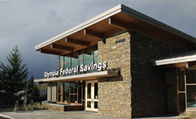It was prejudice that led to the founding of the City of Tumwater. Often called the “First American Settlement” north of the Columbia River, or the first American settlement in Washington, it was laws against blacks in the Oregon territory that led to the city’s founding.
Michael T. Simmons, often called the founder of Tumwater, was born in Kentucky and moved ever westward. In 1844 he joined a wagon train in Missouri headed to the Oregon territory.
In his party was George Washington Bush, a prosperous Missouri farmer and a mulatto, who was also headed west. Along with Jim McAllister and other local well-known names they set out.
After reaching Oregon in 1845, they discovered a recently passed a law which forbid “men of color” from settling in the territory. This applied to Bush. North of the Columbia River was British territory. Because Bush was well-respected and had helped fund some of the party, they decided to move north.
Simmons explored the land in the south Puget Sound basin and in 1845, a party of more than two dozen, including Bush, Simmons and McAllister settled on the DesChutes River in what is now Tumwater.
Communication with the local native tribes was difficult, but the two cultures adopted a language called “Chinook Jargon”. The Indians called the DesChutes falls “tumbling waters” or TumChuck in Chinook Jargon, and the area became know as Tumwater.
Helped by the power of the DesChutes Falls, Tumwater prospered and flourished in its early years. Using the power of the falling water, were a saw mill, a wooden pipe company, a grist mill and in later years, an electric power company.
To its north, the City of Olympia was growing and in 1853 a road connecting Tumwater and Olympia was established, helped by the building of a bridge over Budd Inlet in 1860.
Led by the manufacturing base along the river, several commercial businesses began operating on the Tumwater bluff. This business area late became Tumwater Square. In 1892 a streetcar line connecting the Tumwater business district with Olympia was opened.
In 1896, Leopold Schmidt, from Montana by way of Germany opened the Capital Brewery near the falls, taking advantage of the artesian water which sprang from the soil. In 1902 it became the Olympia Brewing Company.
Successful until prohibition, the brewery closed, only to re-open in 1933 and under the control of the Schmidt family became the leading industry in the town. During the 1970’s Olympia Beer was the largest selling beer in California.
The Schmidt family sold the brewery in 1982, which was sold once again and at the beginning of a new century, was closed. The brewery sits vacant, waiting for a rebirth, while city fathers and mothers hire consultants and advisors on reuse of the property.
While the DesChutes falls were used for power generation and the first electrical power plant in the county was constructed at the falls in 1893, the use of water power diminished, and with it, the manufacturing base of Tumwater.
Tumwater was severely impacted by the construction of Interstate Five. In the 1950’s, with the national construction of freeway systems around the country Tumwater lost nearly 100 buildings and businesses when the new highway went right through the heart of the city.
It was a blow that took nearly 50 years for Tumwater to recover from.
But Interstate Five, the freeway, also opened up other opportunities. Business began to locate at an area called Southgate, helped by a new hotel complex called the Tyee. City fathers and mothers packed up their belongings and moved into a new city hall complex on Israel Road adjacent to the Olympia Airport.
With the eventual vacation of the Tyee, many major retailers located on or near the area of Trosper and Littlerock roads, including Walmart, Costco and Safeway.
Several new office buildings were constructed near the airport, most of them leased to the State of Washington. And the city punched through a new street called Tumwater Boulevard.
Recently the city annexed significant properties on the Tumwater’s south borders and cast its eye toward the future.



















































